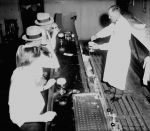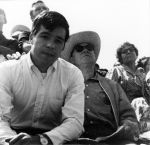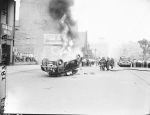Blogs
Subject Focus: The Purple Gang
In the Winter 2012 semester, the Reuther Library worked with students in the Graduate Certificate in Archival Administration program at the Wayne State School of Library and Information Science to produce a series of student-written, guest blog posts.
Camille Chidsey is a Library and Information Science graduate student at Wayne State University. Her concentrations are in Archival Administration and Digital Content Management.
"'These boys are not like other children of their age, they’re tainted off color.' 'Yes,' replied the other shopkeeper. 'They’re rotten, purple like the color of bad meat, they’re a Purple Gang.'" read more »
Alan Reuther: the UAW's Voice in Washington
The Walter Reuther Library is pleased to announce that an oral history with Alan Reuther is now open for research. Alan Reuther was the Legislative Director for the United Automobile Workers of America (UAW). He served in the UAW’s Washington Office from 1982 until his retirement in 2010. Over the course of his tenure as Legislative Director, Automotive News often cited Reuther as one of the 50 most influential people in the auto industry. read more »
Fieldwork with the AFT archivist
Another city, another hotel, and another office with documents ready to be appraised and brought to the archive. Sounds mundane, but within these trips there is the element of surprise. What will the file cabinets and dusty boxes contain? Will those in charge of the files be willing to give full access to everything or just one room? What type of work environment will I be in? Are the files ordered or a jumbled mess? What has already been thrown away? Will there be coffee? You never really know what you will find even after speaking with your contact. This is the life of the field archivist. read more »
The 1943 Detroit Race Riot
- Detroit (Mich.) -- Riot, 1942
- Detroit (Mich.) -- Riot, 1943
- Detroit--economic conditions
- Detroit--politics and government
- Detroit--race relations
- Detroit--social conditions
- Discrimination in housing--Michigan
- Housing
- Housing development--Michigan--Detroit
- Jeffries, Edward, 1900-1950
- Race relations
- Race riots
- Racism
- Urban Affairs
- World War, 1939-1945
On June 20, 1943, a fight broke out between African American and white Detroiters spending their Sunday on Belle Isle, the city’s large park in the middle of the Detroit River. Fighting spread to the mainland, and rumors crisscrossed the city, stoking racial tensions that had been running high and threatening to boil over into violence for months. Rioting spread, with little attempt from the police to stop it (in fact, much evidence points to many white police facilitating and even participating in violence against African Americans), and by the time President Franklin Roosevelt sent in federal troops on the evening of June 21, hundreds had been injured, and 34 people had died: 25 African American (17 of whom were shot by police), and 9 white. Of the arrests made later, 85% were African American. read more »




